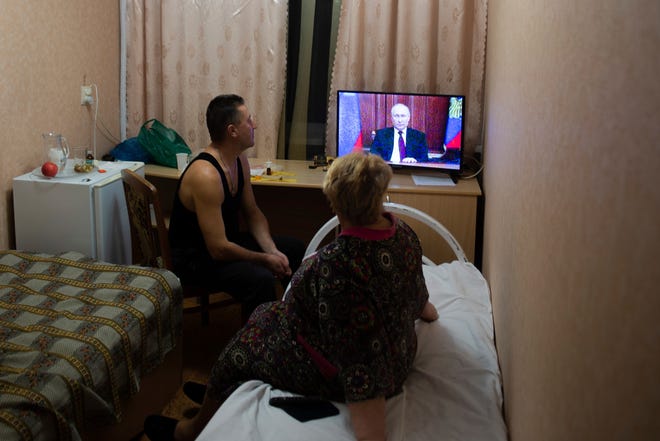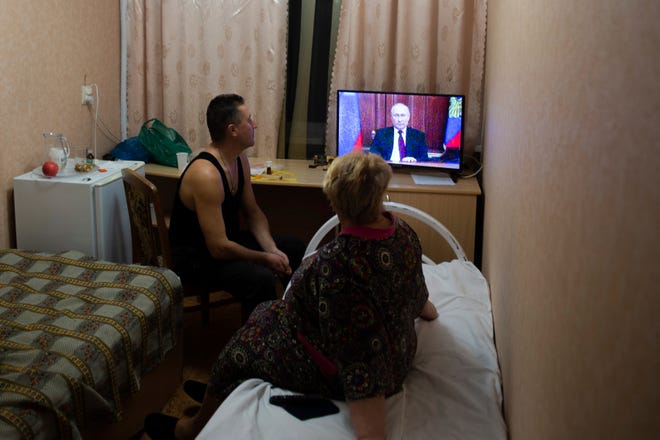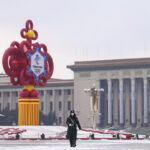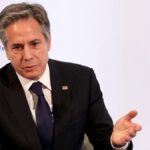- In a long speech on Russian state TV, Putin rejected the idea of Ukrainian nationhood.
- The Russian president directly threatened pro-democracy activists and civil servants.
- His remarks came as Biden met with advisers at the White House on the crisis in Ukraine.
Russian President Vladimir Putin ordered troops Monday to “maintain peace” in two separatist territories in eastern Ukraine shortly after recognizing the Russian-backed areas as independent, stoking fears that a Russian invasion could be coming soon.
The Kremlin decree signed by Putin did not specify whether or when Russian troops would enter Ukrainian territory. It came as President Joe Biden signed an executive order to sanction any Americans who invest in the eastern Ukraine regions of Donetsk and Luhansk, the two breakaway areas that Putin recognized as independent.
Putin’s moves further inflamed tensions with the West amid fears of a potential Russian invasion of Ukraine. Biden is planning to announce additional sanctions on Tuesday, the White House confirmed.
The developments led the U.N. Security Council to schedule an emergency meeting Monday night at the request of Ukraine, the United States and six other countries. Russia, which currently holds the rotating council presidency, has scheduled it for 9 p.m. New York time.
In Washington, a senior Biden administration official accused Putin of seeking to “justify a war” during a rambling, hourlong speech in which he incorrectly claimed that Ukraine was only the product of power-brokering during the beginning of the Soviet Union.
More:Is Russia going to invade Ukraine? Satellite images show the latest Russian troop movements
Yet it was unclear whether Putin’s “peacekeeping” operations in the eastern Donbas region would trigger the full-fledged “severe” sanctions that Biden has threatened if Putin invades Ukraine.
The U.S. will “observe and assess” what Russia does next, the U.S. official said. But, the official said, “Russian troops moving into Donbas by itself would not be a new step” because Russian forces have been in the region for eight years.
Ukraine’s president, Volodymyr Zelenskyy, sought to project calm, telling the country: “We are not afraid of anyone or anything. We don’t owe anyone anything. And we won’t give anything to anyone.”
– Joey Garrison, AP
Biden planning new sanctions Tuesday
Biden will announce new sanctions on Russia Tuesday in response to Russian President Vladimir Putin ordering troops to two separatist territories in eastern Ukraine, according to the White House.
“We plan to announce new sanctions on Russia tomorrow in response to Moscow’s decisions and actions today,” a White House spokesperson confirmed late Monday night. “We are coordinating with Allies and partners on that announcement.”
The severity of the sanctions is unclear. The penalties will be in addition to limited economic sanctions Biden approved Monday prohibiting U.S. trade and investments in the Russian-backed eastern Ukraine regions of Donetsk and Luhansk. That move came after Putin declared the two areas as independent.
Putin later ordered troops to “maintain peace” in two separatist territories, stoking fears that a full-scale invasion could be coming soon. It’s unclear whether or when Russian troops might move into those areas.
Biden has warned for weeks that any Russian invasion of Ukraine would result in “swift and severe” sanctions. But a senior U.S. official, speaking on the condition of anonymity, indicated that an invasion of the eastern Donbas area in Ukraine might not meet that bar.
The official said “Russian troops moving into Donbas by itself would not be a new step” because Russian forces have been in the region for eight years.
— Joey Garrison
Where things stand
- Putin orders troops into Ukraine
Putin ordered troops Monday to “maintain peace” in two separatist territories in the eastern Ukraine shortly after recognizing the Russian-backed areas as independent, stoking fears that a Russian invasion could be coming soon. A Kremlin decree signed by Putin did not specify whether or when Russian troops would enter Ukrainian territory. .
- Biden signs limited sanctions after Putin
Biden signed an executive order Monday implementing minor economic sanctions banning U.S. trade and investments in Donetsk and Luhansk in response to Putin recognizing the independence of the separatist regions. The White House made clear that these are not the full-fledged sanctions the U.S. and allies are prepared to take if Russia conducts a fell-scale invasion.
- US: Putin’s speech was designed to ‘justify war’
The Biden administration accused Putin of seeking to “justify a war” in his speech Monday before the Russian president recognized two separatist parts of eastern Ukraine as independent. In a speech aired on Russian state television, Putin called it “madness” that Ukraine has independence during his hourlong speech, incorrectly claiming that the country was only the product of power-brokering during the beginning of the Soviet Union.
- UN Security Council holds emergency meeting
Monday’s developments led the U.N. Security Council to schedule an emergency meeting Monday night at the request of Ukraine, the U.S. and six other countries. The meeting was set to begin at 9 p.m. EST.
- US diplomats relocating
US diplomats in Ukraine will temporarily relocate to Poland, although US Secretary of State Antony Blinken said those personnel will “regularly return” to continue diplomatic work.
— Joey Garrison
US diplomats relocating to Poland
American diplomats stationed in Ukraine will temporarily relocate to Poland, Secretary of State Antony Blinken announced Monday, amid fears of an imminent Russian invasion.
“For security reasons, Department of State personnel currently in Lviv will spend the night in Poland,” Blinken said. “Our personnel will regularly return to continue their diplomatic work in Ukraine and provide emergency consular services.”
Blinken made the announcement after Russian President Vladimir Putin ordered Russian forces to “maintain peace” in eastern Ukraine. It was not immediately clear if troops would enter Ukrainian territory, but the Biden administration has been warning for weeks that Russia plans to invade its neighbor.
The State Department has urged Americans in Ukraine to leave the country – a message Blinken reiterated on Monday.
“The security situation in Ukraine continues to be unpredictable throughout the country and may deteriorate with little notice. There is a strong likelihood that any Russian military operations would severely restrict commercial air travel,” Blinken said.
He said Russian troops have continued to move closer to the border “in what looks like plans for an invasion at any moment” and included an ominous message to Americans who choose to remain in Ukraine.
“In the event of an attack, U.S. citizens should seek shelter in a hardened structure and monitor major news outlets for guidance on when it is safe to move,” he said.
— Deirdre Shesgreen
US: Putin’s speech was designed to ‘justify war’
The Biden administration accused Vladimir Putin of seeking to “justify a war” in his speech Monday before the Russian president recognized two separatist parts of eastern Ukraine as independent.
In an address on Russian state television, Putin made several false claims that seem “designed to excuse possible military action,” a senior Biden administration official, speaking on the condition of anonymity, told reporters. “This was a speech to the Russian people to justify a war.”
Putin called it “madness” that Ukraine has independence during his hourlong speech, incorrectly claiming that the country was only the product of power-brokering during the beginning of the Soviet Union.
“We believe he made clear his true design,” the official said. “This wasn’t a speech just about Russia’s security. It was an attack on the very idea of a sovereign and independent Ukraine.”
Biden imposed limited economic sanctions Monday in response to Putin signing decrees Monday recognizing the Russian-backed eastern Ukraine regions of Donetsk and Luhansk as independent. An executive order signed by Biden sanctions Americans who invest in the eastern Ukraine regions of Donetsk and Luhansk.
Russian troops continue to move closer to the Ukraine border “in what looks like plans for an invasion at any moment,” the official said, also pointing to new reports that Russia has ordered “peacekeeping” operations in the two separatist regions.
Yet it was unclear whether the latest actions would be met with full-fledged “severe” sanctions that Biden has threatened if Putin invades Ukraine.
The official said “Russian troops moving into Donbas by itself would not be a new step” because Russian forces have been in the region for eight years. The U.S. will “observe and assess” what Russia does in the hours ahead, according to the official, and would respond in a way that’s “appropriate to the action.”
– Joey Garrison
Executive order bans financial actions
Biden’s order will bar Americans from new investment, trade and financing to, from or in the regions, according to the statement. Additional measures related to what Psaki described as a “blatant violation of Russia’s international commitments” are also expected.
The executive order is separate from the economic measures Biden and Western allies have vowed to impose on Moscow should Russia further invade Ukraine.
“We have anticipated a move like this from Russia and are ready to respond immediately,” Psaki said. “We are continuing to closely consult with allies and partners, including Ukraine, on next steps and on Russia’s ongoing escalation along the border with Ukraine.”
Biden spoke with Ukraine President Volodymyr Zelesnkyy on Monday afternoon as Putin delivered televised remarks justifying his decision to recognize the two Ukrainian provinces as independent states. Biden also convened a call with French President Emanuel Macron and German Chancellor Olaf Scholz, according to the White House.
Biden also met with members of his national security team at the White House on Monday. Vice President Kamala Harris, Secretary of State Antony Blinken, Defense Secretary Lloyd Austin, Homeland Security Secretary Alejandro Mayorkas, and Gen. Mark Milley, chairman of the U.S. Joint Chiefs of Staff, were in attendance, according to a White House official who spoke on condition of anonymity in order to discuss details of the meeting.
Biden, who had nothing on his public schedule for Presidents Day, spent the holiday weekend meeting with members of his national security team as Russian troops ratcheted up military drills at Ukraine’s borders.
More:The enigma of Vladimir Putin: What do we really know about Russia’s leader?
Putin lays blame on NATO
Putin justified his decision in a far-reaching, pre-recorded speech blaming NATO for the current crisis and calling the U.S.-led alliance an existential threat to Russia.
Putin directly threatened pro-democracy activists and civil servants who had led the pro-democracy push in the country after the 2014 revolution ousting a pro-Russian government.
“We know their names, and we will find them and bring them to justice,” he said.
The Russian president also claimed, without evidence, that Ukraine was preparing to develop its own nuclear weapons that could threaten Russia.
Ukraine had been an independent country and a member of various imperial blocs, including the Russian empire, for centuries before becoming a member state of the Soviet Union during the 20th century. Historians are in broad agreement that there has long been a linguistic and cultural Ukrainian identity distinct from Russia.
A recognition of Donetsk and Luhansk as independent states has major implications. The Russian-backed rebels fighting the Ukrainian military there do not control all the territory they claim. Russian recognition of the full claim sets the groundwork for military support into Ukrainian territory.

EU announces sanctions
The European Union’s top officials say the bloc will impose sanctions against those involved in Russia’s recognition of the two separatist regions amid fears of a potential Russian invasion of Ukraine.
EU Commission President Ursula von der Leyen and Council President Charles Michel say in a joint statement that the recognition is “a blatant violation of international law.” The statement adds that the bloc “will react with sanctions” and “reiterates its unwavering support to Ukraine’s independence, sovereignty and territorial integrity within its internationally recognized borders.”
More:Ravaged by ongoing war, people in Ukraine’s Luhansk region want the shooting to end
Sullivan: Russian attack would be ‘major’
Earlier Monday, U.S. national security adviser Jake Sullivan again warned that Russian forces are mobilizing for an impending, bloody invasion of Ukraine. That came less than a day after Biden agreed “in principle” to meet with Putin should Russia not invade.
“All signs look like President Putin and the Russians are proceeding with a plan to execute a major military invasion of Ukraine,” Sullivan said Monday on ABC News. Over the past 24 hours, Russian forces have been “getting in position to attack.”
Sullivan told NBC News’ “Today” that the Biden administration is working on dual tracks, ready to “respond decisively” in case of invasion, yet ready “to settle this peacefully.
More:Is Russia going to invade Ukraine? Satellite images show the latest Russian troop movements
Macron tried to broker a summit between Biden and Putin in a series of calls over the weekend. His office said both leaders “accepted the principle of such a summit,” to be followed by a broader summit meeting involving other “relevant stakeholders to discuss security and strategic stability in Europe.” It added that the meetings “can only be held on the condition that Russia does not invade Ukraine.”
More:‘Shields up’: Biden administration moves to protect U.S. targets from Russian cyber attack
Kremlin spokesman Dmitry Peskov said Monday that Putin and Biden could meet if they consider it necessary, but he emphasized that “it’s premature to talk about specific plans for a summit.”
“When President Macron asked President Biden yesterday if he was prepared in principle to meet with President Putin if Russia did not invade, of course President Biden said yes,” Sullivan said. “The meeting is possible if the leaders consider it feasible,” he said in a conference call with reporters.
Contributing: The Associated Press
Follow Matthew Brown online @mrbrownsir.




